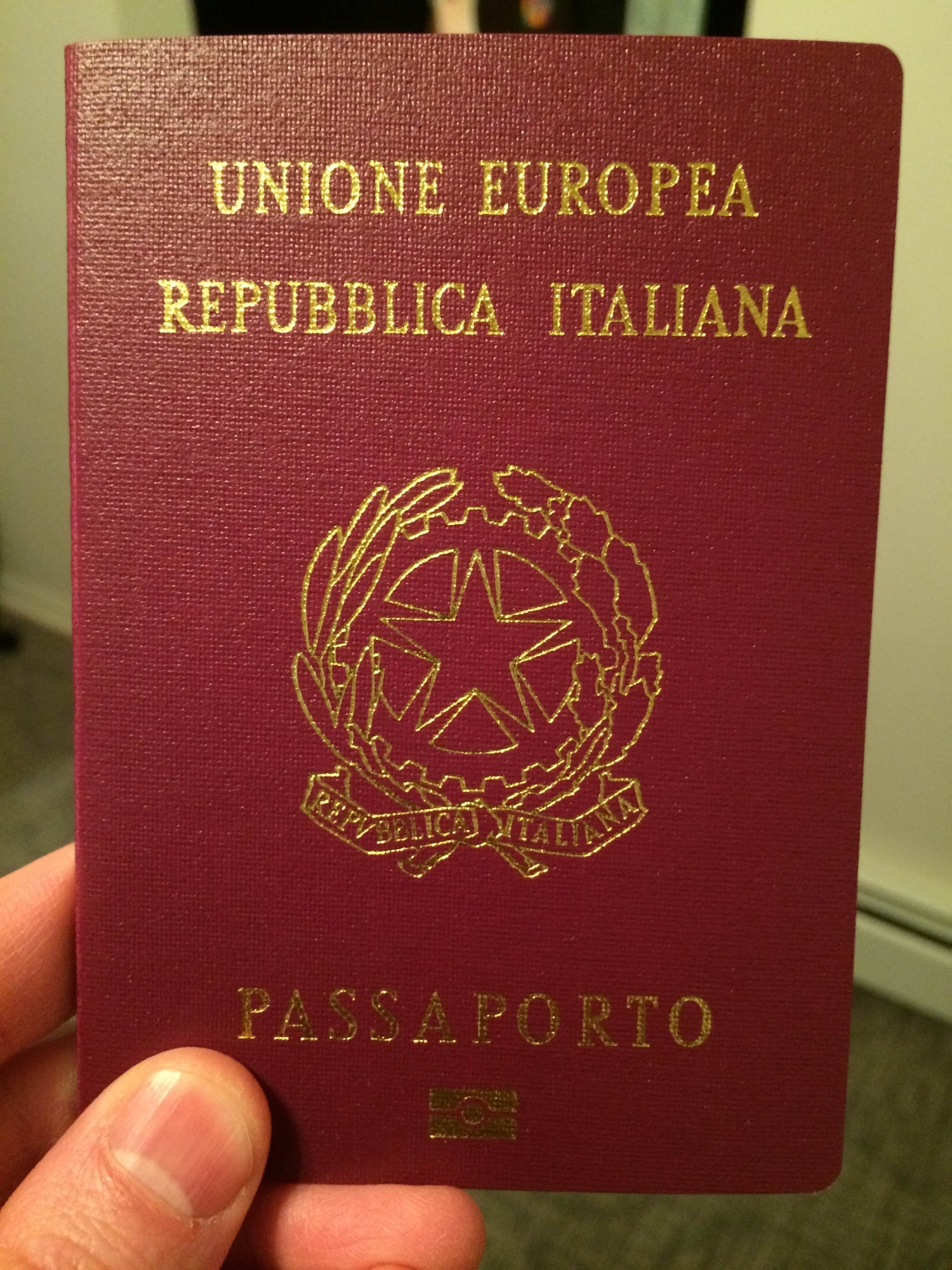I am just going to blurt it out: I’M OFFICIALLY A DUAL CITIZEN.
Did I yell that?
I’m sorry. I don’t know how to contain the excitement I’m feeling. I have never worked so hard for anything in my life. To see that effort (impossibly) come to fruition is beyond words. I feel like I won 10 Super Bowls.
And now, like many before me, I’m going to write about it. This is an endeavor that people need to know about. If you’re eligible—and really good at paperwork—you’d be crazy not to pursue it.
The country is Italy, and the method of attainment is jure sanguinis: right of blood. Some other countries offer citizenship by jure sanguinis, but Italy offers among the most liberal terms. You needn’t be a refugee, or party to a particular historical event, or even prove fluency in the language. There’s also no generational limit: you can trace your descent back to the origins of the modern Italy state, if you have the paperwork to prove it.
You do, however, need to fit a particular criteria: you must be the descendant of an Italian ancestor who was still an Italian citizen at the time he or she birthed/sired children. For example, my grandfather was born in 1926. His father—my great-grandfather—was still an Italian citizen at that time. He only received his U.S. citizenship six years later in 1932. Therefore, my grandfather (if he was still alive) and all of his descendants are eligible for Italian citizenship through my great-grandfather.
Compare this to my great-grandfather’s later children, all born after 1932. None of them are eligible for Italian citizenship because they were born to a then-U.S. citizen. It hardly seems fair—that’s their father, while I’m several generations down the line. But I’m eligible and they’re not. Timing, here, is everything.
If you fit this criteria, you have to prove it to an Italian consulate. That means getting birth records, marriage records, and (if applicable) death records going all the way back to your ancestor. You need that ancestor’s Italian birth certificate, issued by the Comune where your ancestor is from. You need a U.S. Certificate of Citizenship for that ancestor, or barring that, a certified document stating that no such record exists. If there are discrepancies in any records, their issuing offices need to draw up documents clarifying that—and I can tell you, the further back you go, the more discrepancies your documents will be plagued with. All U.S. documents need an Apostille (an authentication for international use). All non-Italian documents and Apostilles need professional Italian translations.
That covers most of it. You may need more.
This ends up being a mountain of paperwork, and you will spend north of $1,000 producing it. If you enlist hired help, you can expect to double or triple that number. That’s not to mention the investment of time. I don’t know how many hours I spent on this, and I don’t want to know.
This is all assuming you’re even capable of proceeding. My great-grandfather died in 1953. My parents weren’t even alive when he was. We knew very little about him. It was an investigation to figure out where he was from, and which Comune had jurisdiction there. For the Comune to produce his birth record, they need information. They need to know the year of birth, or at the least a small range of years. I could only give them a range because (big surprise) I had documents stating different years of birth. Records from that time period are abysmal.
So while there is no generational limit, remember it’s as far back as you can prove. At a certain point of disconnection from the motherland, even impressive detective skills might not be enough.
You’d think the U.S. side of things would be easier, but that’s not necessarily true. I spent many an hour at the wrong county courthouse, requesting records that weren’t there. When it comes to long ago marriages, you’d perhaps not be surprised how no one remembers where they took place. You need that location: marriage records are held at the county level, at least in Pennsylvania.
Then you finally find the right courthouse, and they show you a marriage record that says your grandfather was born in Pittsburgh, when the birth record from the state says Bridgeport. THEN you’re talking to the county clerk—it has to be the person at the top, not an underling—because you need a clarification, and only his stamp is going to be good enough. He tells you, “I can’t change this document.” And you have to insist, “No, I don’t need you to change it. I just need you to draft a letter stating that in your best judgement this marriage record has an inaccuracy.”
It never ends.
Seemingly so. But eventually, it will. With enough money, time, and determination, you’ll get it done.
That’s the trick, though: how much free time do you have, and what is it worth to you? When I started this process in 2012, my time was less valuable. I had hours and hours to spare. If I had to start from Square One today, in 2016, I don’t think I could do it. I haven’t the time.
Consider something else: the ease (relatively speaking) of pursuing these records really comes down to where you live vs. where your ancestors lived. At that time in 2012, I was living in close proximity to the county courthouses I had to deal with. The complexity of some of my requests to these offices was such that being able to go there, in person, was clutch—maybe essential. You could probably get it done over the phone, or by letter, but you may be adding considerably more time and hassle to the process.
And then there’s the Consulate.
The only Consulate you can work with is the one that has jurisdiction over your place of residence. That’s your advantage or disadvantage, and there’s nothing you can do about it short of moving. You may live hundreds of miles from your Consulate—you may live States away. I can only speak first-hand of Philly, and I feel fortunate to have lived so close to it.
To start with, you’re going to want to make your appointment right away, because you won’t get it for one year, minimum. I hear the wait time for New York is two years. That may seem like a long time, but you’ll need a good portion of it to get all of your documents ready.
Every Consulate has its own quirks—too many to lay out here. But you should know that your Consulate is probably buried in work. Contacting them directly is extraordinarily difficult. It’s best to find support among your peers. This was my go-to forum.
You will have a lot of questions, I guarantee it. It doesn’t matter how many people have done this before you; your questions will be unique enough from theirs that finding a satisfactory answer will not be easy. The Consulate doesn’t want to hear from you. There’s probably no phone number they’ll pick up, and no email they’ll return sooner than weeks—if ever. In a lot of ways this is the most difficult part of the whole process.
What’s worse, you can’t even necessarily trust what they do tell you. At my appointment, I was told that I would receive a citizenship certificate in the mail. Once I received it, I would know that I could come back and apply for a passport.
Three years later: no certificate. No email. No phone call. I thought my application had fallen through the cracks.
After a significant amount of pestering, I learned that I was a recognized citizen six months after I turned in my paperwork—and no one ever notified me by any means. Where’s my citizenship certificate? According to one of the workers at the office, they don’t issue them.
It’s hard to complain about good news. I did the impossible: I saw this process through to a successful conclusion. But the tenuous line of communication between the applicant and Consulate makes me want to rip my hair out and scream. This process is hard enough without the Consulate making it undeniably harder by refusing to keep a reasonable communication channel open for prospective citizens. The probable truth is, they’re so overwhelmed they couldn’t care less about someone who isn’t a citizen yet. That’s the Catch-22 you have to look forward to if you go down this path.
Most of my battle is done now. I’m dealing with one final problem: my Comune claims it hasn’t received my paperwork from the Consulate. The Consulate insists they’ve sent it. It looks like they’re going to have to send them again.
Guess what?
They won’t answer my emails.
After all of this, you may be wondering why I wrote, “you’d be crazy not to pursue it”. I don’t know if I can adequately describe the feeling of holding that passport in my hand. It’s overwhelming.
The truth is, I didn’t think a lot about the meaning of citizenship until that passport arrived. What does it mean, really? In essence, it’s a large group of people all agreeing that such-and-such person is one of us. Citizenship means community. It’s a home. It’s a group of people taking responsibility for your welfare, and that responsibility is mutual.
There are so many people in this world without any proper citizenship at all. Most of the monks I once taught in Nepal were effectively stateless. But two good countries have given me citizenship. I’m truly blessed.
Is it worth it?
Absolutely.



